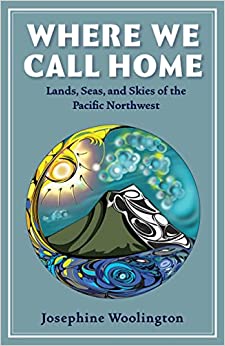

Reconnect with the natural world through essays that blend science and prose. In her debut work, Where We Call Home: Lands, Seas, and Skies of Pacific Northwest, Portland-based journalist and Willamette Writers member Josephine Woolington sheds light on diverse flora and fauna of the Pacific Northwest, from the coastal tailed frog to yellow-cedar. Through interviews with local biologists, historians, artists, and Indigenous leaders and scientists from the Confederated Tribes of Grand Ronde, Haida Nation, Yakama Nation, and the Makah Tribe, these stories encourage a more collective understanding of our natural wonders in a rapidly changing world.
The book will be published by Portland State University’s Ooligan Press on November 15. Josephine and the book’s illustrator, Ramon Shiloh, will be joined in conversation by Michelle Nijhuis, author of Beloved Beasts, at Powell’s Books downtown store on November 15 at 7 pm.
“A deep dive into connections with the land and the life-forms that call the Pacific Northwest home. Fascinating. Sobering. Inspiring.” —Jane Billinghurst, co-author of Forest Walking: Discovering the Trees and Woodlands of North America
“In a series of beautiful essays on the foraging western bumble bee, the stunning sandhill crane, the long-lived yellow-cedar, and more, Where We Call Home takes us on a journey to explore the natural histories of ten native species in the Pacific Northwest. It is a powerful meditation on the past, present, and possible future of this land, its inhabitants, and our own relationship with nature.” —Lauren E. Oakes, author of In Search of the Canary Tree: The Story of a Scientist, a Cypress, and a Changing World
“Josephine Woolington is a model of a particular kind of curiosity that is at root a form of love—love for the plants and animals and geography that together make up the place she occupies. Where We Call Home is an invitation to pay attention to and become intimate with the world beyond the self. And it is a welcome addition to the literature of the Pacific Northwest.” —Scott F. Parker, author of A Way Home: Oregon Essays and Being on the Oregon Coast
“Once she realizes that ‘it’s radical to be rooted in a place,’ writer and educator Josephine Woolington embarks on a journey to learn about her home in the Northwest. Focusing on ten native species, she follows her journalist’s curiosity, interweaving natural history with the cultural history she sets out consciously to learn. In her hands, what first looks like a random selection ranging from camas, sandhill cranes, and yellow-cedar to moss, bumble bees, and clouds becomes a window into the stories of the local tribes who’ve long stewarded their kin, the scientists who study them, and others who’ve learned how to pay attention. From an artist who attended to clouds in order to draw them to a whaling chief’s moving account of how a gray whale hunt restored the Makah culture, her stories invite us to become as rooted, attentive, and respectful wherever we call home.” —Holly J. Hughes, author of Passings, a 2017 American Book Award winner
“Josephine Woolington leaves no stone unturned in these explorations of iconic Northwest lifeforms. She does not flinch in the face of degradation and future threats, she understands that tribal knowledge plays a crucial role in our larger story, and she offers a path forward based on meticulous attention. We should listen.” — Jack Nisbet, author of Sources of the River, The Collector, and Visible Bones
“This book is about listening to the voices of plants, animals, Indigenous leaders, scientists, and artists to find and nourish something we all need: an enduring sense of place.” —Scott Freeman, author of Saving Tarboo Creek: One Family’s Quest to Heal the Land
